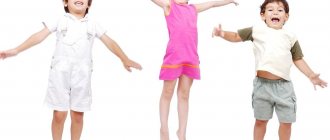The topic of child adaptation in kindergarten is always relevant, but in recent years it has become increasingly acute. The pace of modern life dictates its own rules, and parents do not want to lag behind it, so from an early age they send their child to kindergarten, where they are faced with difficulties in getting the child accustomed to new conditions and do not understand how to resolve them correctly.
Development and education of children from 2 to 11 years old in a playful way
Start practicing right now
Start practicing
In this article we will look at what a child’s adaptation to preschool is, what degrees and stages of adaptation exist, and how to help a child successfully overcome this difficult period.
Adaptation in kindergarten - what is it?
Imagine the world of a two or three year old child. He has his beloved mom and dad, toys that are dear to him, a cozy and warm bed, a familiar environment and a comfortable daily routine. And in a moment it changes! His parents take him to an unfamiliar place, where a strange aunt is, there are unfamiliar children everywhere who can hit him and take away his toys, someone is always crying, and in general he becomes sad and just wants to go home! This place is a kindergarten.
Finding yourself in an unfamiliar environment, the child feels confused and experiences severe stress. To get used to new conditions, time must pass, which is called the adaptation period.
When a child begins to attend kindergarten, adaptation affects not only him, but also his parents. But it’s much easier for adults to cope with it, because their bodies are more stress-resistant. Childhood adaptation is more difficult because the baby will have to:
- get used to a different daily routine;
- learn to be independent and do without the help of parents (use the potty, wash hands, drink and eat, undress, get dressed);
- to remain without mom and dad among peers who have different characters, and not all of them will have mutual understanding;
- listen to and comply with the requirements of teachers;
- to be away from familiar things and home environment;
- not getting enough attention. It is especially difficult for only children in the family, who are accustomed to always having time for them.
Degrees of adaptation to kindergarten
Teachers and psychologists distinguish three degrees of children’s adaptation to kindergarten: easy, medium and severe, each of which has its own terms and characteristics.
A mild degree lasts from two weeks to a month. It is characterized by:
- Peaceful sleep for your baby, including daytime and nighttime sleep. If the child wakes up, he falls asleep again easily and quickly.
- A good appetite. Sometimes there is selectivity in food, this is normal.
- Calm and balanced state of the baby.
- A child without hysterics is left without parents and can play independently.
- Ease of behavior with peers and teachers.
Even with this degree of adaptation, the baby may experience sleep and appetite disturbances, slight nervousness and moodiness in the first weeks of visiting kindergarten, because the daily routine changes, new people and responsibilities appear.
The average degree of adaptation lasts 1-2 months. The child gets sick more often, so he attends kindergarten intermittently.
What indicates an average degree of adaptation?
- Restless sleep of the baby, which is often interrupted. Sometimes a child cannot fall asleep at all in the garden.
- Decreased appetite: the baby eats little or flatly refuses any food.
- Inconstancy of emotions. The child is sad and cries, his mood often changes. The baby can play alone, but not for long.
- The child has difficulty parting with his parents, then sits alone.
- The baby does not show much interest in communicating with other children and constantly asks the teacher when he will be picked up.
A severe degree of adaptation lasts from 2 months to six months. In rare cases, the child does not get used to kindergarten at all. Then psychologists and teachers recommend taking a long break or stopping taking your child to preschool.
How to understand that a child has a difficult degree of adaptation to kindergarten?
- The baby does not sleep during the day, sleep is also restless at night, and the child is tormented by fears.
- The appetite is reduced, the baby often refuses to eat.
- Emotions are unstable: the child is thoughtful, withdraws into himself, or, on the contrary, is excited and aggressive.
- Parting with parents is difficult and is accompanied by screams, sobs and hysterics.
- The child does not want to communicate with adults or peers and is withdrawn or aggressive.
We can talk about the completion of adaptation of any degree after the adjustment of sleep, appetite, emotional state, the baby’s behavior when parting with parents and the desire to communicate with other children and adults.
Stages of adaptation of children in kindergarten
This difficult time is divided into three main stages:
- preparatory;
- key;
- final.
Parents need to approach each of them responsibly, because this will determine how easy the child’s adaptation to kindergarten will be.
Preparatory stage
This is the longest and most significant stage; the success of adaptation largely depends on preparation. What should parents do during this period?
- First of all, gradually expand your child’s social circle and involve him in joint games with other children.
- Second, start talking about kindergarten early. While walking, pass next to him and tell him how many children there are and how much fun they have playing with each other. Show the bright areas in the garden, watch the kids frolicking there. Let your child develop the idea that the garden is a place for active games in the company of playful peers.
- Teach your child self-care skills: eat, wash, and go to the toilet independently.
- At least a couple of months in advance, try to set up a routine, correlating it with the kindergarten’s operating hours. That is, getting up, napping during the day, breakfast, lunch and dinner, walking and going to bed should be at approximately the same time. If you succeed, you will shorten the process of adaptation of your child.
Key stage
This important day has arrived for the baby - he is going to kindergarten for the first time! May this morning be filled with good mood! A delicious breakfast or favorite clothes can cheer him up.
At this stage, the child remains in the child care facility for a maximum of 1-3 hours to get to know the teachers, peers and get used to the regime. The more pleasant emotions the baby receives at this stage, the faster he gets used to it and begins to enjoy joining the new team.
Final stage
The child stays in kindergarten for 3 or more hours, including naps, and then longer.
How to understand that the baby has successfully adapted?
- he remains quietly in the preschool;
- communicates easily with the teacher and other children;
- has good sleep and a healthy appetite;
- emotionally stable, no sudden and frequent mood swings, apathy or aggression.
It is possible to judge the completion of the adaptation process only after several months of the child’s attendance at kindergarten, because frequent illnesses of preschoolers prolong this process. Be patient, your support and love will help your baby calmly overcome this difficult path.
Recommendations for parents on how to make separation from their baby easier
Information for parents about adaptation to kindergarten is often located on stands in the locker room and issued in the form of reminders and booklets. It will be good if parents prepare and set up their child for new living conditions long before he appears on the threshold of the group.
Necessary actions
- Come up with your own farewell ritual with your baby, which will instill in him confidence that his mother will definitely return. This can be any simple action: the phrase “I love you,” a kiss on the nose, or a firm handshake. Always. When leaving the baby with one of the other adults, perform the same action so that the child remembers it. By saying goodbye in this way, the child will more easily part with his mother in the preschool locker room.
- About six months before going to kindergarten, begin to involve other adults in communicating with the child, so that he has experience of parting with his mother and interacting with other adults. You can start with them communicating in the presence of mom, and then start being away for longer and longer periods of time.
- Gradually leave the baby alone in the room while the mother is out of sight. Sometimes it’s worth inviting him to play on his own, without the participation of adults - this skill will also be needed in kindergarten.
- Try to form a positive self-esteem and ideas about yourself for the baby: tell him how smart, independent, cheerful and sociable he is. At the same time, it is necessary to avoid statements that the child is unsociable, capricious or angry.
Unnecessary actions
- Never leave your child when he is distracted. In this situation, he is very scared that his mother has disappeared to God knows where. Next time he will try with all his might not to let his mother leave him even one step.
- Do not try to leave the child alone at home, even going to the store located in the neighboring house. Firstly, this will increase the baby’s anxiety level, and secondly, in just a few minutes he can find himself in danger in his own apartment.
- There is no need to buy your child something tasty or toys every time after a separation: if he develops an understanding that something material awaits him after the separation, such purchases will have to be made every day when the child goes to kindergarten.
Perform developmental exercises from Ikyusha
Mathematics
Reading
The world
Logics
English language
Stages of addiction
We talked about the degrees and stages of children’s adaptation to kindergarten, but also every baby goes through a period of adjustment. What is important to know about this?
Stage 1 - maladjustment.
No matter how successful the preparatory adaptation is, at first the baby will still be in a state of stress and anxiety. Even the most active and sociable children need time to get used to parting with their parents. Colds appear.
Stage 2 - adaptation.
The child begins to gradually get used to the new regime, other children and adults, and participates in games, although he continues to miss his family and ask if they will take him away. Changeable moods, whims, and refusal to comply with the teacher’s requests may be observed.
Stage 3 - compensation.
At the final stage of adaptation, the baby is already emotionally stable and calmly remains in the garden for the whole day, eats and sleeps well. The child begins to get sick less often.
Tips from Komarovsky for parents on how to adapt their child to kindergarten
A famous doctor also speaks about the adaptation of a young child in kindergarten. Evgeniy Olegovich believes that successful adaptation to a preschool educational institution is one of the conditions for the harmonious development of a child. He gives the following advice to parents regarding their child's adaptation to kindergarten:
- Do not go to work on the same day that your child goes to kindergarten for the first time. Komarovsky believes that adaptation in kindergarten will be better if the mother has a few weeks left to sit with the baby for a few days if he is unwell, without creating problems for himself at work.
- Getting used to kindergarten is better in winter and summer; during off-season periods there is a higher probability of going on sick leave, going to kindergarten for only a few days. In this case, after the illness, adaptation in kindergarten, according to Komarovsky, will begin anew.
- It is mandatory to prepare the immune system for encounters with new viruses and bacteria: harden yourself, eat fresh fruits and vegetables to fortify the body, walk more often and longer.
- According to Komarovsky’s advice, adaptation in kindergarten will be easier if at its initial stages you lower the level of demands on the baby: allow him a little more than usual, be more lenient towards his whims and requests.
The influence of various factors on adaptation
Why do some children adapt easily, while others have difficulty? What influences this process?
Child's age
In many families, after the birth of a baby, the level of material well-being changes, so mothers tend to send their child to kindergarten and go to work as soon as possible. It is not surprising that in recent years the need for nurseries, which accept children from 1.5 years old, has increased.
But how ready is the baby for this? Most teachers and psychologists believe that the appropriate age to begin adapting to kindergarten is 2.5-3 years, when the child’s immunity has already strengthened, he has basic self-care skills and is not in such dire need of parental care and attention. The younger the child, the more complex and difficult the adaptation is. Therefore, if possible, it is better to leave children under 2.5 years of age at home.
Of course, there are exceptions when the baby is ahead of his development and needs communication, shows interest in his peers, actively participates in all games, and is simply bored at home. In such cases, kindergarten is a suitable environment for a little fidget, even if he has not reached 2.5 years.
Health status
This is one of the key factors. Often, even healthy children, when they start going to kindergarten, often get sick. For children with disabilities or chronic diseases, the process of adaptation is especially difficult.
Therefore, first improve your child’s health, and then start attending kindergarten. This way the baby will be able to adapt without serious problems.
State of the art
Here it is important to talk about the necessary skills that a child must have before starting kindergarten life: hold a spoon and a cup, drink and eat independently, use the potty, if possible, dress and undress and ask for help from an adult.
If the baby does not have self-care skills and is accustomed to his parents doing everything for him, then the process of adaptation can take a long time.
Socialization of the child
In a preschool institution, a child will be in the company of peers and teachers. If a child has experience communicating with other children and adults, besides parents, then it will be easy for him to join the team. When a child is used to seeing only mom and dad next to him, the process of getting used to it will be more difficult and longer.
Other factors
What else affects adaptation and habituation to the garden?
- Experience and personality of the teacher. Some teachers know how to create such a favorable and friendly atmosphere in the group that even uncommunicative and closed children feel lightness and comfort and want to return to the kindergarten. That’s why they often say: “You need to go not to the garden, but to the teacher.”
- Number of children in the group. The fewer students, the more attention the teacher can pay to each child.
- The baby's temperament also affects the duration of adaptation in kindergarten. For example, sanguine children love communication and feel comfortable in a group, and therefore adapt more easily than melancholic children.
Classes for children to prepare for kindergarten
Role-playing games and listening to fairy tales are favorite pastimes for young children. Therefore, advice from a psychologist often includes items such as activities and fairy tales for successful adaptation to kindergarten. The purpose of such games is to familiarize the child with the regime and rules of kindergarten in a relaxed manner.
Enlist the “support” of children’s toys – dolls, teddy bears. Let your favorite plastic friend become a teacher, and the teddy bear and robot become kindergarteners who are just attending preschool.
Moreover, classes should be repeated almost the entire day of the future preschooler. That is, the teddy bear came to the kindergarten, said hello to the aunt-teacher, kissed mommy goodbye and began to play with the other children. Then he had breakfast and began to study.
If a child has difficulty parting with his mother, special emphasis should be placed on this particular moment. To do this, it is better to use special fairy tales for quick adaptation in kindergarten, in which, for example, a kitten stops crying after the mother leaves and begins to play happily with other animals.
Another opportunity to make adaptation to kindergarten easier is to use available tools: presentations, cartoons and a collection of poems about kindergarten. Such useful innovative materials adapt children no worse, and sometimes better, than ordinary stories.
How to help your child adapt to kindergarten?
Most adults are worried about leaving their child in kindergarten. This is quite normal, since the baby is there alone among unfamiliar adults and equally confused peers.
But every parent wants to help their child easily overcome such a difficult period! How to do it? Teachers and psychologists give the following recommendations:
- Parents' anxiety increases the baby's fears, so try to be calm and balanced, surrounding your child with a sense of security.
- Talk to your child about kindergarten. This is good to do at the preparatory stage of adaptation: arouse his interest, tell him how many children there are and how much fun they have, what games he can play with them.
- While walking, pass by a kindergarten, draw your child’s attention to the bright playgrounds and children frolicking there, making him want to join. Try to walk more often in any weather, let your child get used to the fact that you will go to preschool in both snow and rain. The purpose of conversations and walks around the kindergarten is to create a positive image, an understanding of how fun, calm and safe it is, even in the absence of parents.
- Talk through your baby's daily routine: breakfast, games, walk, lunch, sleep, dinner, and so on. Let him know at what point you will come for him today, so that the child is calm and knows that after dinner he will see his mother again. And be sure to come at the specified time.
- Together with your child, come up with a farewell ritual. It can be anything: a kiss, a handshake, clapping your hands, tickling or funny sounds. It is important to adhere to this ritual before parting in the garden and outside it. This will give the baby a feeling of security.
- If the kindergarten rules allow, allow your child to take his favorite toy with him. In the absence of parents, it will give peace and remind you of home, where it is so warm and cozy.
- If it is difficult for a child to part with his mother, then the father or another family member can take him to kindergarten.
- During the adaptation period, try not to start something new and generally change your usual way of life (for example, travel, moving, long business trips for parents, divorce) so that the child does not have reasons for additional stress.
- Read books in which the main characters started attending kindergarten. Publications with such stories can be easily found in any bookstore. Create different situations with your baby’s favorite toys: “Tim the Rabbit with the children on a walk”, “Nina the Horse sleeps in a quiet hour” and so on. Let these stories become familiar and understandable to the child.
Stages of adaptation
Experts identify several periods, summarizing them with pronounced negative reactions and unusual behavior. All children are unique and individual, so this division into stages is quite arbitrary; it helps to roughly delimit the periods and understand how easy and successful adaptation will be.
- The first stage is called acute, it is the most difficult, as a rule. The child is in a stressful state, the entire child’s body is in mobilization, the baby is tense and scared. Most often, tearfulness, hysteria, whims, and screams are noted. Physiology also changes. You can observe an increase in pressure, pulse, or, conversely, a decrease in heart rate. The child is more susceptible to all kinds of infectious diseases.
- The next stage is moderately spicy. The child’s negative reactions decrease, he begins to adapt to new circumstances, places and people, appetite and sleep return, and the psycho-emotional background improves. However, you should not hope that the situation has improved; it is too early to talk about complete adaptation, since everything can return to the first stage, along with hysterics, tears and a reluctance to let mom go in the morning.
- The final stage is compensatory. At this stage, the child’s emotional background stabilizes. There is a complete restoration of mental and physiological states. The baby begins to interact with peers, the teacher, and quite successfully integrates into the new “habitat”.
Concept
Adaptation is adaptation to a new environment . At the same time, certain changes occur in the psyche, which requires quite a lot of energy expenditure. The baby experiences a lot of emotions, he needs to adapt to new conditions.
Not all children immediately get used to kindergarten. Some people have problems. This is due to many factors: character traits, psychological state, problems in the family, methods of education, the ability of teachers to find an approach to children.
When a child enters a preschool institution, his life changes greatly, and going to kindergarten is also associated with stress :
- Mom and relatives are not nearby, but there are strangers and other children;
- the daily routine changes, it becomes clearer;
- have to interact with other children;
- there is a need to obey the demands of strangers;
- Less time is given to each individual child - there can be 10-20 people in the group at the same time.
The process of adaptation to new conditions proceeds differently for each individual. The success of the adaptation process is judged by the duration of adaptation and the severity of problems that may arise.










